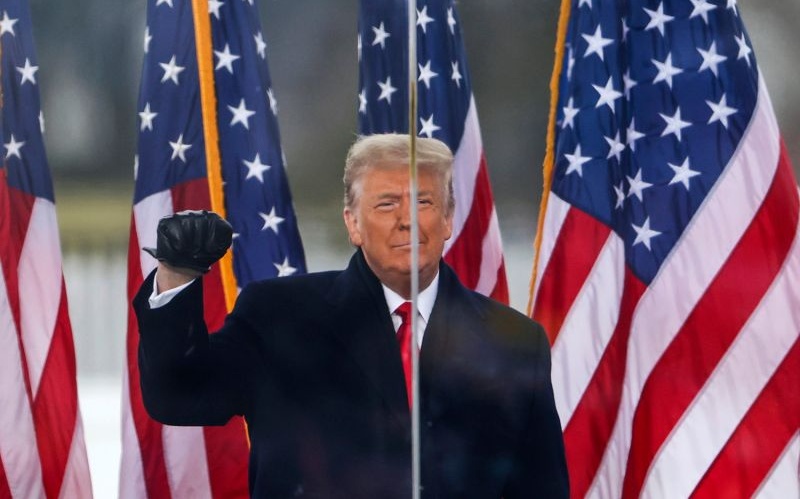Donald Trump speaks to followers outside the White House, January 6 (Tasos Katopodis/Getty)
UPDATE, MARCH 29:
A federal judge ruled on Monday that Donald Trump and his lawyer John Eastman most likely committed felonies as they tried overturn the 2020 election, including obstruction of Congress and conspiracy to defraud the United States.
Judge David Carter of the Central District of California wrote:
The illegality of the plan was obvious.
Our nation was founded on the peaceful transition of power, epitomized by George Washington laying down his sword to make way for democratic elections. Ignoring this history, President Trump vigorously campaigned for the vice president to single-handedly determine the results of the 2020 election.
He summarized that the plot amounted to “a coup in search of a legal theory”.
Judge Carter was commenting over the civil case of Trump’s lawyer, John Eastman, who set out the plan for Vice President Mike Pence to prevent the Congressional certification of Biden’s Electoral College victory. Pence refused to cooperate with the plot, and Trump supporters attacked the Capitol to prevent the completion of the certification.
Trump has not yet been charged with a crime. However, the judge’s ruling bolstered the assessment of the House select committee on the Capitol Attack that Trump’s actions could constitute a criminal conspiracy.
UPDATE, MARCH 24:
A senior prosecutor in Manhattan has written that Donald Trump is “guilty of numerous felony violations” and that it is “a grave failure of justice” not to hold him accountable.
Mark Pomerantz was one of two prosecutors who resigned in late February, upset that the Manhattan District Attorney abruptly stopped pursuit of an indictment.
In his resignation letter, Pomerantz said District Attorney Alvin Bragg’s decision was “contrary to the public interest”: “The team that has been investigating Mr. Trump harbors no doubt about whether he committed crimes — he did.”
Pomerantz and fellow prosecutor Carey Dunne intended to charge Trump with falsifying business records and his annual financial statements. But Bragg halted presentation of the evidence to a grand jury.
The District Attorney’s office maintains that it is still conducting the investigation.
Pomerantz wrote in his resignation letter:
No case is perfect. Whatever the risks of bringing the case may be, I am convinced that a failure to prosecute will pose much greater risks in terms of public confidence in the fair administration of justice….
There are always additional facts to be pursued. But the investigative team that has been working on this matter for many months does not believe that it makes law enforcement sense to postpone a prosecution in the hope that additional evidence will somehow emerge….
I and others believe that your decision not to authorize prosecution now will doom any future prospects that Mr. Trump will be prosecuted for the criminal conduct we have been investigating.
ORIGINAL ENTRY, FEB 24: Two prosecutors leading the investigation of Donald Trump’s business practices by the Manhattan District Attorney’s office have resigned.
The prosecutors, Carey Dunne and Mark Pomerantz, reportedly quit abruptly because the new Manhattan District Attorney, Alvin Bragg, told them that he has doubts about proceeding with the case.
Presentation of evidence to a grand jury has been paused for a month. Prosecutors postponed a plan to question at least one witness.
In contrast, the New York State Attorney General’s office is proceeding briskly with a civil investigation of Trump and the Trump Organization.
See also Judge: Trumps Must Testify in Fraud Investigation
New York Attorney General: Trump Organization’s “Fraudulent or Misleading” Practices
The reasons for District Attorney Bragg’s hesitancy to proceed are unknown. The investigation is facing the obstacles of the Trump Organization, whose executives are refusing to cooperate.
The grand jury’s term is scheduled to expire in April. Prosecutors can request jurors to extend their service but usually avoid doing so, and they often do not want to seat a new grand jury because of the possibility that witnesses will alter their statements.
Bragg’s predecessor Cyrus Vance moved quickly after obtaining Trump Organization documents under a court order. The first testimony was heard last June. The Trump Organization and its Chief Financial Officer, Allen Weisselberg, were indicted a month later.
In mid-January, Trump’s long-time accountant and an expert in the real estate industry testified, but the grand jury sessions were then suspended.
Another criminal investigation, in New York’s Westchester County, is proceeding over Trump’s possible fraud at one of his golf courses.


Ex-US Generals Warns Of Possible Military Coup After 2024 Presidential Elections: https://www.republicworld.com/world-news/us-news/ex-us-generals-warns-of-possible-military-coup-after-2024-presidential-elections.html
““In a contested election, with loyalties split, some might follow orders from the rightful commander-in-chief, while others might follow the Trumpian loser. Arms might not be secured depending on who was overseeing them. Under such a scenario, it is not outlandish to say a military breakdown could lead to civil war.”